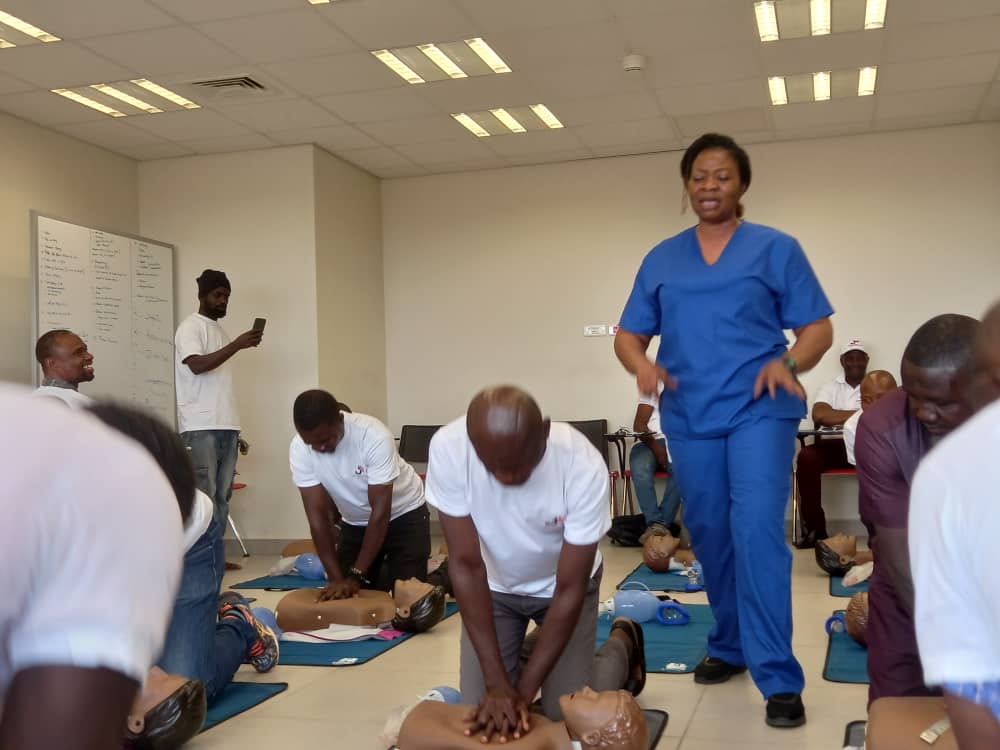By Joyce Danso
Accra, March. 03, GNA – Dr Gladys B. Nuamah, Deputy Director, Medical Training and Simulation Centre, University of Ghana Medical Centre, has advised Ghanaians to desist from taking pictures of accident victims and scenes and splashing them on social media.
Dr Nuamah said Ghanaians should rather assist by offering Cardiopulmonary Resuscitation (CPR)/ First Aid (basic life support) to the victims before various ambulances arrive at accident scenes.
She noted that in most cases people involved in accidents do not die instantly, adding “if people offer basic life support to them before an ambulance arrives, they could save lives.”
Dr Nuamah said at the training of some selected commercial drivers and transport operators in the La Nkwantang Municipal Area (Madina) in Cardiopulmonary Resuscitation (CPR)/ First Aid.
CPR is an emergency procedure consisting of chest compressions often combined with artificial ventilation in an effort to manually preserve intact brain function until further measures are taken to restore spontaneous blood circulation and breathing in a person who has cardiac arrest.
The training programme was held by Jadarls Foundation, a nongovernmental organisation in collaboration with the University of Ghana Medical Centre (UGMC).
The 25 drivers were selected from the Ghana Private Road Transport Union (GPRTU), AMOT Transport Union and Cooperative.
The drivers are expected to train their counterparts on basic life support.
Dr Nuamah told the drivers that it was important for them to do three things anytime an accident occurred.
According to her, it was key to check out if victims have suffered cardiac arrest by ascertaining whether the victim was responsive, the person was breathing and a check on the victim’s pulse.
Additionally, Dr Nuamah said Ghanaians should undergo at least yearly check-
ups to detect some cardiovascular diseases.
She said the practice of some Africans noy reporting to the hospital should be discarded.
“Ideally, we should at least visit the hospital every year for a checkup. It should be a birthday present. We should not wait until we get sick, and we are carried in a vehicle to the hospital.”
She said UGMC was ready to partner organisations and groups to offer basic life support to them so they could offer help whenever the need arose.

Mr Justice Ayee, Human Resource Manager of Jadarls Foundation, said a number of accidents and cardiovascular diseases occurred at various lorry stations and most drivers lacked the knowledge on how to help in terms of providing basic life support.
Mr Ayee said the drivers would be offered free First Aid Kits to assist them in helping victims when the need arose.
Ms Davida Pappoe, Programmes Lead, Jadarls Foundation, said the foundation observed that some people die because they did not have any knowledge on how to handle injuries or the injured.
Mr Pappoe said the training programme on Cardiopulmonary Resuscitation (CPR) was dear to the heart of the foundation, adding that the foundation’s focus was on commercial drivers.
She said apart from the training, the foundation would offer them stickers and pen drives containing lifesaving messages and learning materials so that when passengers sit in vehicles they would also watch and learn from those materials.
According to the Programmes Lead, the foundation hoped to train about 2,000 drivers nationwide on CPR and First Aid.
She said the foundation intended to train more drivers to commence with its operations for the first quarter of the year on seizures, and epilepsy, among others.
She said the foundation would extend the education to lorry stations in Accra, mainly Lapaz, Tema Station, 37 as well engage drivers who embark on long distance journeys.
Mr Joseph Tetteh Arthur, Secretary, Madina-Somanya GPRTU, was optimistic that the training would assist him handle emergencies.
Jadarls Foundation is an independent entity of the Jadarls Group with the mandate to research and undertake social intervention programmes.
It also seeks to bridge the gap between humanity and access to basic human needs, including healthcare, food security and climate change, through rigorous research and social interventions with a focus on improving the living standards of the poor and deprived communities in Ghana.
GNA